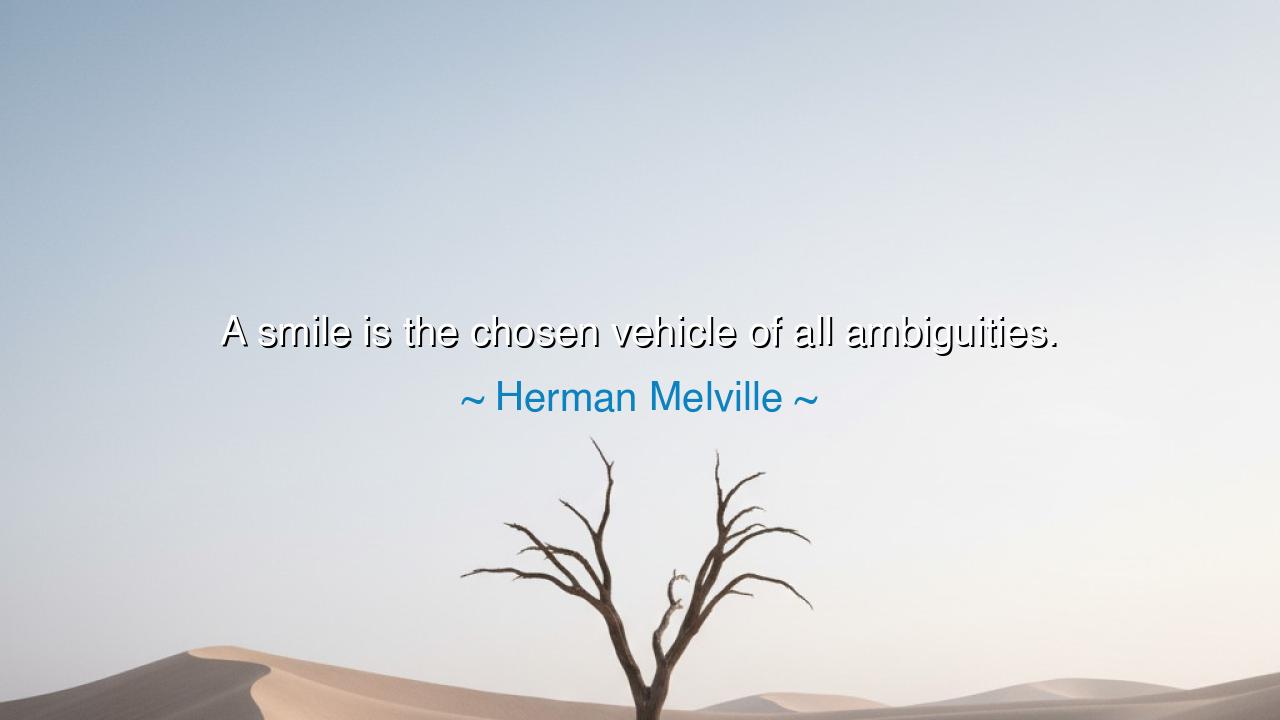
A smile is the chosen vehicle of all ambiguities.






The words of Herman Melville—“A smile is the chosen vehicle of all ambiguities.”—are as deep and mysterious as the sea upon which so many of his tales are set. In them we hear the echo of human complexity: the truth that the smile, that most universal of gestures, is not always a pure window of joy but often a mask, a veil, a vessel carrying meanings both hidden and layered. A smile may comfort, or it may deceive. It may conceal pain, or it may mock in silence. Thus, Melville names it the “vehicle of all ambiguities,” for no expression is at once so clear to the eye and yet so uncertain to the heart.
The ancients themselves would have understood this paradox. For they often warned that the face is a stage upon which the soul performs its drama. A smile may mean welcome or rejection, approval or irony, sincerity or treachery. One may smile to bless, or smile to betray. The ambiguity lies not in the lips themselves, but in the vast ocean of human intention. And so the smile becomes the perfect symbol of mankind’s double nature: the yearning for truth and the temptation toward concealment.
History offers countless examples of this dual power. Consider the story of the Byzantine court, where ambassadors and generals were welcomed with smiles by emperors whose hands, even as they clasped in friendship, plotted betrayals in secret chambers. A smile gave the illusion of peace, while armies prepared for war. Yet in another age, think of Eleanor Roosevelt, whose smile in the darkest days of World War II was a beacon of comfort to soldiers and civilians alike. Both were smiles, but one cloaked treachery, the other carried hope. In this, Melville’s words prove eternal: the smile holds every ambiguity, from kindness to cruelty, from honesty to disguise.
Melville himself, the author of Moby-Dick, was no stranger to the contradictions of the human heart. He sailed seas where men lived close together in hardship, and there he saw smiles used to soothe tensions and to conceal rivalries alike. A sailor might smile at his captain in obedience, while silently cursing him. Another might smile to give courage to a comrade as storms threatened to sink the ship. From such experiences, Melville drew his truth: that the smile is the most human of masks, chosen not because it is false, but because it is flexible—a vessel of many meanings.
The lesson for us is not to distrust every smile, but to recognize the depth of human expression. Do not assume the meaning of a smile too quickly. Look beyond the surface, for sometimes behind the brightest smile lies sorrow untold, and behind the faintest curve of lips lies a heart full of courage and love. The ambiguity of the smile is not its weakness but its strength, for it allows us to live in the tension of being human—vulnerable yet proud, joyous yet wounded, open yet guarded.
In our own lives, we must learn to smile with sincerity, even knowing that others may use theirs differently. We must also cultivate discernment: to comfort those whose smiles hide pain, to see beyond mockery to the wounded soul beneath, to answer cruelty with compassion. And when we ourselves smile, let it not be empty but filled with truth. For though a smile may be ambiguous, it can also be the bearer of honesty when the heart wills it so.
Practically, this means paying attention to the hearts behind faces. When a friend smiles but their eyes glisten with sadness, do not be deceived—ask, listen, and stand beside them. When a stranger offers a false smile, meet it with kindness, not cynicism, for the mask may conceal a battle you cannot see. Above all, let your own smile be the gift that clarifies rather than confuses, the smile that assures rather than deceives. In this way, you turn the vehicle of ambiguity into a chariot of light.
Thus, Herman Melville’s wisdom remains a guide: “A smile is the chosen vehicle of all ambiguities.” Remember this, and you will neither be fooled by appearances nor enslaved by them. Instead, you will live wisely—offering smiles that heal, discerning those that conceal, and accepting that in the mystery of the human face lies both the shadow and the light of civilization itself.






AAdministratorAdministrator
Welcome, honored guests. Please leave a comment, we will respond soon